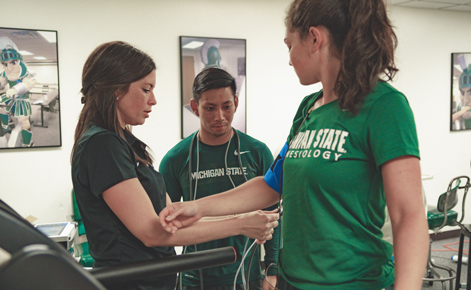Can the time of day you exercise improve your blood pressure?
A study led by Michigan State University scholars will examine this and related questions with a $3 million grant from the National Institutes of Health.
The research will examine if exercising at specific times of day improves nocturnal blood pressure in older adults with hypertension. Nearly half of adults in the United States have hypertension or are taking medication for hypertension, according to the Centers for Disease Control and Prevention.
“Hypertension, or high blood pressure, is when vascular function decreases. Exercise has been documented to help increase function. Our study looks at if exercising at certain times of the day has a greater effect than other times,” said Katharine Currie, principal investigator and assistant professor in the MSU College of Education Department of Kinesiology. “Timing an intervention with the body’s internal rhythms, or chronotherapy, is an emerging and exciting field of study.”
If not treated, hypertension can damage arteries, decreasing blood flow and oxygen to the heart, which can lead to heart disease. Heart disease is the leading cause of death in the U.S.
Nighttime blood pressure
“Blood pressure has a natural rhythm, changing over the course of the day,” said Jill Slade McMahon, associate professor in the MSU College of Osteopathic Medicine Department of Radiology and primary co-investigator. “We will be studying how nighttime blood pressure is impacted by exercise at different times of day as blood pressure dipping at night is an important component of cardiovascular health.”
Participants will use an ambulatory blood pressure monitor, worn throughout daily lives and activities, to assess 24-hour blood pressure patterns.
The multi-disciplinary research team also includes George Abela, MSU Health Care’s Chief of Cardiology and professor in the College of Human Medicine Department of Medicine; Supratik Rayamajhi, associate professor and interim chair of the College of Human Medicine Department of Medicine; and Marianne Huebner, director of the MSU Center for Statistical Training and Consulting and a faculty member in the Colleges of Natural Science and Education.

Abela worked with the pioneer group at Harvard Medical School studying the daily rhythm of blood pressure and its ramifications on triggering of heart attacks and stroke. Exercise may reduce some of these risks and provide additional benefits that could help scholars and health professionals understand how blood pressure contributes to acute cardiovascular events.
“From a health care provider’s point of view, there is added value in having knowledge of ambulatory blood pressure while managing cardiovascular health,” said Rayamajhi, an American Society of Hypertension Certified Hypertension Specialist. “This study could offer evidence that may help us have a targeted intervention and better treat our patients.”
The study is actively recruiting participants. For more information contact bloodpressure@msu.edu or check out the BP Research Study screening form.
This story originally appeared on the College of Education website.

